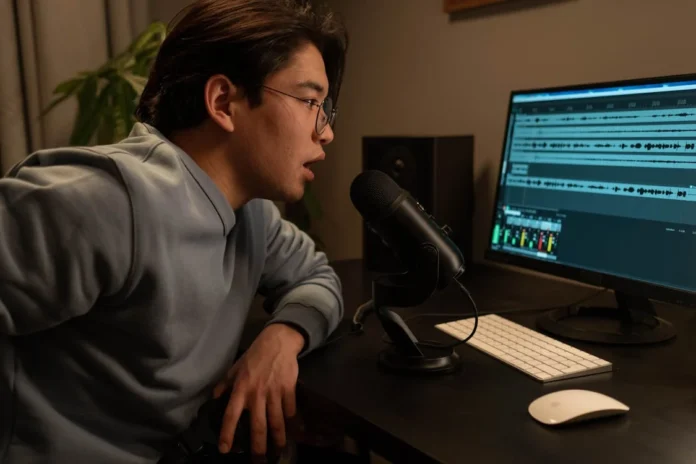The entertainment sector is currently experiencing a significant transformation, largely due to the progress in artificial intelligence (AI). One of the most fascinating innovations is AI voice cloning, which can create artificial voices that closely resemble real human voices. This groundbreaking technology is changing different aspects of the entertainment industry, including movies, TV shows, video games, and music. Let’s explore how AI voice cloning is reshaping entertainment and its potential for future creativity and production.
Table of contents
- What is AI Voice Cloning?
- Enhancing Film and Television Production
- Reviving Iconic Voices
- Voiceovers and Dubbing
- Transforming the Gaming Industry
- Creating Diverse Characters
- Dynamic Dialogue Generation
- Innovating the Music Industry
- Virtual Performances
- Voice Preservation
- Revolutionizing Audiobooks and Podcasts
- Efficient Production
- Personalized Listening Experiences
- Ethical Considerations and Challenges
- Consent and Ownership
- Combating Misuse
- Future Trends and Innovations
- Integration with Other Technologies
- Collaborative Creativity
- Conclusion
What is AI Voice Cloning?
AI voice cloning significantly impacts the gaming industry by offering a cost-effective alternative to hiring numerous voice actors. This technology enables developers to easily create diverse and dynamic characters for games featuring extensive dialogue. Additionally, advancements like the AI rapper voice generator are allowing artists to experiment with new vocal styles and genres, making the technology even more versatile across creative fields.
Enhancing Film and Television Production
One of the most significant impacts of AI voice cloning is on film and television production. Traditionally, voice acting and dubbing require actors to spend countless hours in the studio, often re-recording lines to achieve the perfect take. AI voice cloning streamlines this process by allowing producers to generate high-quality voice overs quickly and accurately.
Reviving Iconic Voices
Imagine being able to bring back the iconic voices of legendary actors who have passed away. AI voice cloning can recreate these voices, allowing filmmakers to produce new content featuring beloved characters. This technology can breathe new life into classic films and series, offering fans a nostalgic experience while introducing these characters to new generations.
Voiceovers and Dubbing
AI voice cloning is also revolutionizing voiceovers and dubbing. By generating synthetic voices that match the original actors, AI can produce seamless dubs in multiple languages. This not only enhances the viewing experience for international audiences but also reduces production costs and time.
Transforming the Gaming Industry
The gaming industry is another area where AI voice cloning is making a significant impact. Video games often feature extensive dialogue, requiring numerous voice actors to bring characters to life. AI voice cloning offers a cost-effective and efficient alternative, enabling game developers to create diverse and dynamic characters with ease.
Creating Diverse Characters
With AI voice cloning, game developers can create a wide range of characters without the need for a large cast of voice actors. Consequently, this allows for more complex and engaging narratives. Additionally, developers can explore different accents, dialects, and speech patterns, which helps create a rich and immersive gaming experience.
Dynamic Dialogue Generation
AI voice cloning also facilitates dynamic dialogue generation, where character responses can be tailored based on player choices. This increased level of interactivity greatly enhances the overall gaming experience, providing players with a more personalized and immersive adventure.
Innovating the Music Industry
In the music industry, AI voice cloning is opening up new possibilities for creativity and collaboration. Additionally, artists can use cloned voices to experiment with different vocal styles, harmonies, and effects, thus pushing the boundaries of musical innovation.
Virtual Performances
Virtual performances and holographic concerts are becoming increasingly popular. AI voice cloning can recreate the voices of artists, allowing them to perform “live” concerts without being physically present. This technology can also be used to create duets between living artists and their late idols, offering fans a unique and memorable experience.
Voice Preservation
AI voice cloning can preserve the voices of iconic musicians. Furthermore, by creating digital replicas of their voices, these artists can continue to “release” new music, delighting fans long after their physical presence is gone.
Revolutionizing Audiobooks and Podcasts
The audiobook and podcast industries are benefiting immensely from AI voice cloning. Moreover, this technology allows for the efficient production of high-quality audio content, providing listeners with a more engaging and personalized experience.
Efficient Production
Traditionally, recording audiobooks and podcasts requires significant time and effort. However, AI voice cloning can streamline this process, producing clear and consistent narration quickly and affordably. This technological advancement enables authors and content creators to release new material at a faster pace, thereby keeping their audience engaged.
Personalized Listening Experiences
AI voice cloning can provide personalized listening experiences, thereby allowing listeners to select the voice that narrates their audiobooks or podcasts. This customization enables the content to be more enjoyable and tailored to individual preferences, ultimately enhancing user satisfaction and fostering loyalty.
Ethical Considerations and Challenges
Despite the numerous advantages associated with AI voice cloning, it also presents ethical dilemmas and challenges. The concern lies in the potential misuse of this technology, particularly in the creation of deep fake audio to deceive or manipulate others. To ensure ethical usage, it is imperative to establish comprehensive ethical guidelines and regulatory frameworks.
Consent and Ownership
One of the key ethical concerns revolves around obtaining consent for voice cloning. Individuals must have control over their own voices, and explicit permission should be required before cloning a voice. Additionally, issues of ownership and intellectual property rights need to be addressed to protect the rights of voice actors and creators.
Combating Misuse
To combat misuse, developers and policymakers must work together to create safeguards against malicious applications of AI voice cloning. This includes developing technologies to detect deepfake audio. Additionally, implementing legal measures to penalize those who use cloned voices for harmful purposes is crucial.
Future Trends and Innovations
The future of AI voice cloning in the entertainment industry is promising, with ongoing advancements poised to push the boundaries of creativity and innovation even further. As technology evolves, we can expect even more realistic and expressive synthetic voices, capable of conveying a wide range of emotions and nuances.
Integration with Other Technologies
AI voice cloning is likely to be integrated with other emerging technologies such as virtual reality (VR) and augmented reality (AR). This integration could lead to entirely new forms of immersive entertainment, where audiences can interact with characters and narratives in unprecedented ways.
Collaborative Creativity
The future may also see increased collaboration between AI and human creators. AI voice cloning can serve as a tool to enhance human creativity, allowing artists, writers, and developers to explore new ideas and bring their visions to life more effectively.
Conclusion
AI voice cloning is fundamentally transforming the entertainment industry, enhancing production efficiency, enabling creative innovation, and personalizing audience experiences across film, television, gaming, music, audiobooks, and podcasts. While ethical considerations and challenges must be carefully managed, the benefits and potential of this technology are immense. As AI voice cloning continues to advance, it promises to unlock new creative frontiers, blending reality and imagination in ways that will redefine the future of entertainment.











